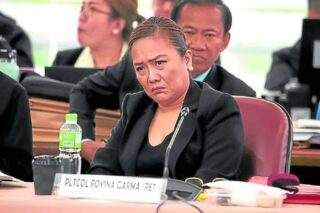When socialite Ruby Tuason returned from hiding in the United States last February and testified before the Senate blue ribbon committee, her much-anticipated turn on the witness stand proved to be a disappointment. The announcement Friday that the Ombudsman had granted her immunity in the so-called pork barrel scam case turns our collective sense of disappointment into dismay.
After her appearance at the Senate, we wrote: “[T]he entirety of Tuason’s testimony was inadequate. It did not deserve Justice Secretary Leila de Lima’s effusive term, that it constituted ‘slam-dunk evidence,’ or [Senator Teofisto] Guingona’s even more elaborate basketball metaphor, that it was a three-point ‘buzzer-beater’ and ‘winning shot’…. The reason we found Tuason’s testimony inadequate was her constant recourse to general statements, whether about the money she delivered or about her recollection of the circumstances of delivery.”
It seemed to us then, and it seems to us now, that such an inadequate testimony did not deserve to be rewarded with a grant of immunity. To be sure, Tuason’s affidavit and her answers at the Senate hearing were the first time anyone had admitted personally handing over kickbacks to a senator implicated in the scam (in this case, old family friend Sen. Jinggoy Estrada). This admission, against Tuason’s own self-interest, has major legal implications, especially for Estrada. But couldn’t government prosecutors have pried this information out of Tuason even if she were an adverse witness?
Her appearance at the Senate raised more questions than she answered. How much of the scam was she a part of, if by her own estimate her 5-percent commission amounted to P40 million? If, going by her estimate of 5 percent, the total amount of Priority Development Assistance Fund allocations that passed through her reached some P800 million, how much of this total went to Estrada and to the other senator whose office she said she was closely coordinating with, Juan Ponce Enrile? Why does she remember only P9 million in kickbacks to Estrada? If she did not keep records, what is the basis for the figures she presented to the Senate?
The official statements of Assistant Ombudsman Asryman Rafanan and De Lima herself, in Friday’s announcement, raised even more questions.
Tuason returned the P40 million she said she received in illegal commissions, through a manager’s check made out to the Republic of the Philippines. But what is the basis for her computation and, even more important, why was the Ombudsman not even interested in double-checking her estimate? (In Rafanan’s words: “There’s no need because the P40 million amount was admitted by Tuason herself and computed by herself as 5 percent of the total amount.”) At the Senate, an emotional Tuason said she would have to sell her lone property, her house in Dasmariñas Village, to raise the money. Did she in fact do this? If she didn’t, how did she raise the P40 million?
We do not wish to discourage the prosecutors at the Department of Justice and with the Office of the Ombudsman; like many Filipinos, they want justice to be done in the case of the billion-peso pork barrel scam. It has taken half a year, but now there are three special resolutions of the Ombudsman finding probable cause to charge Estrada, Enrile and a third senator, Ramon “Bong” Revilla Jr., not only for graft but for plunder. (Others are to be charged too, including the businesswoman alleged to have masterminded the scam in the first place, Janet Lim Napoles, and Enrile’s once-powerful chief of staff, lawyer Gigi Reyes.)
But we wonder whether Tuason’s testimony was in fact so necessary that she had to be made state’s witness. We acknowledge that the original whistle-blowers who exposed the scam welcome the grant of immunity to
Tuason; they see it as validating their own testimony and, in the words of one of their lawyers, “forecloses the need for Janet Napoles to become a state witness.” But still: Tuason is going to get off easy. Doesn’t that send the wrong message?


